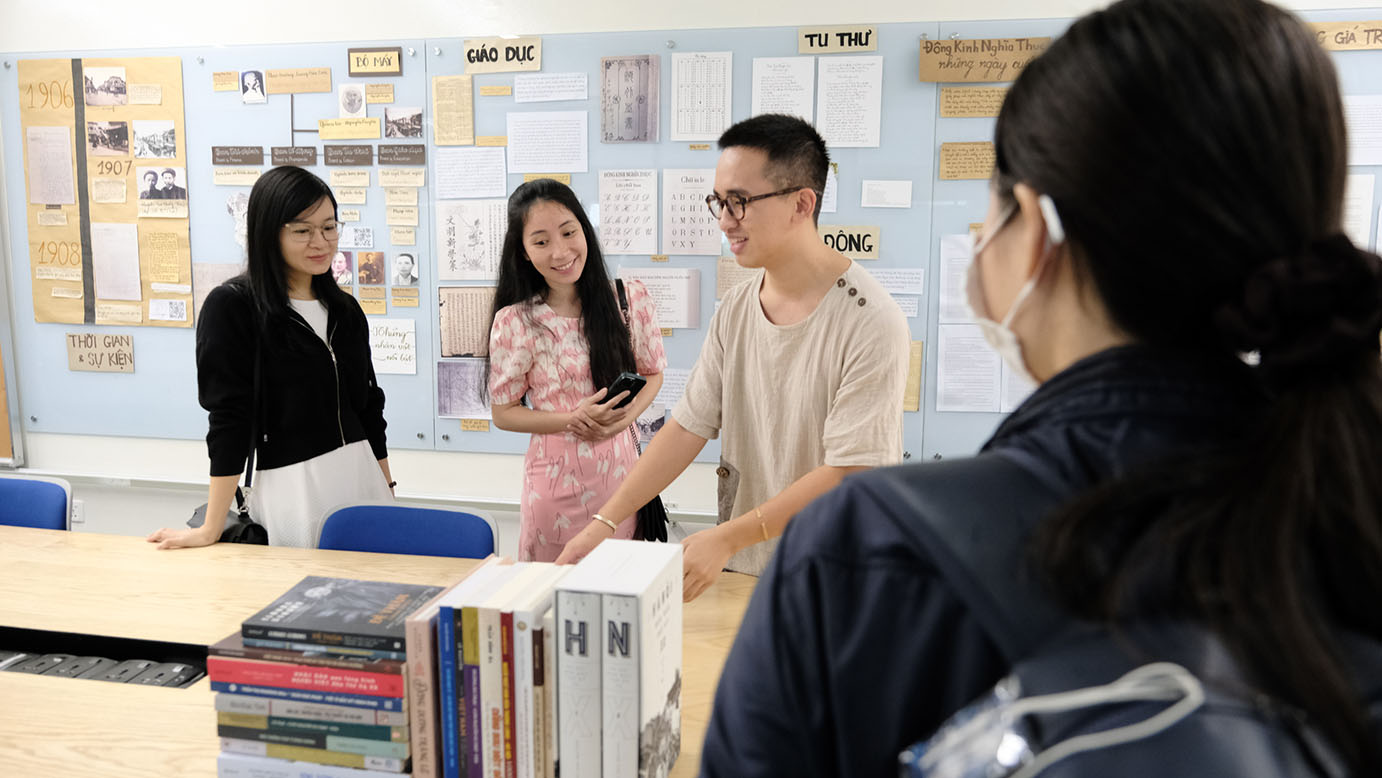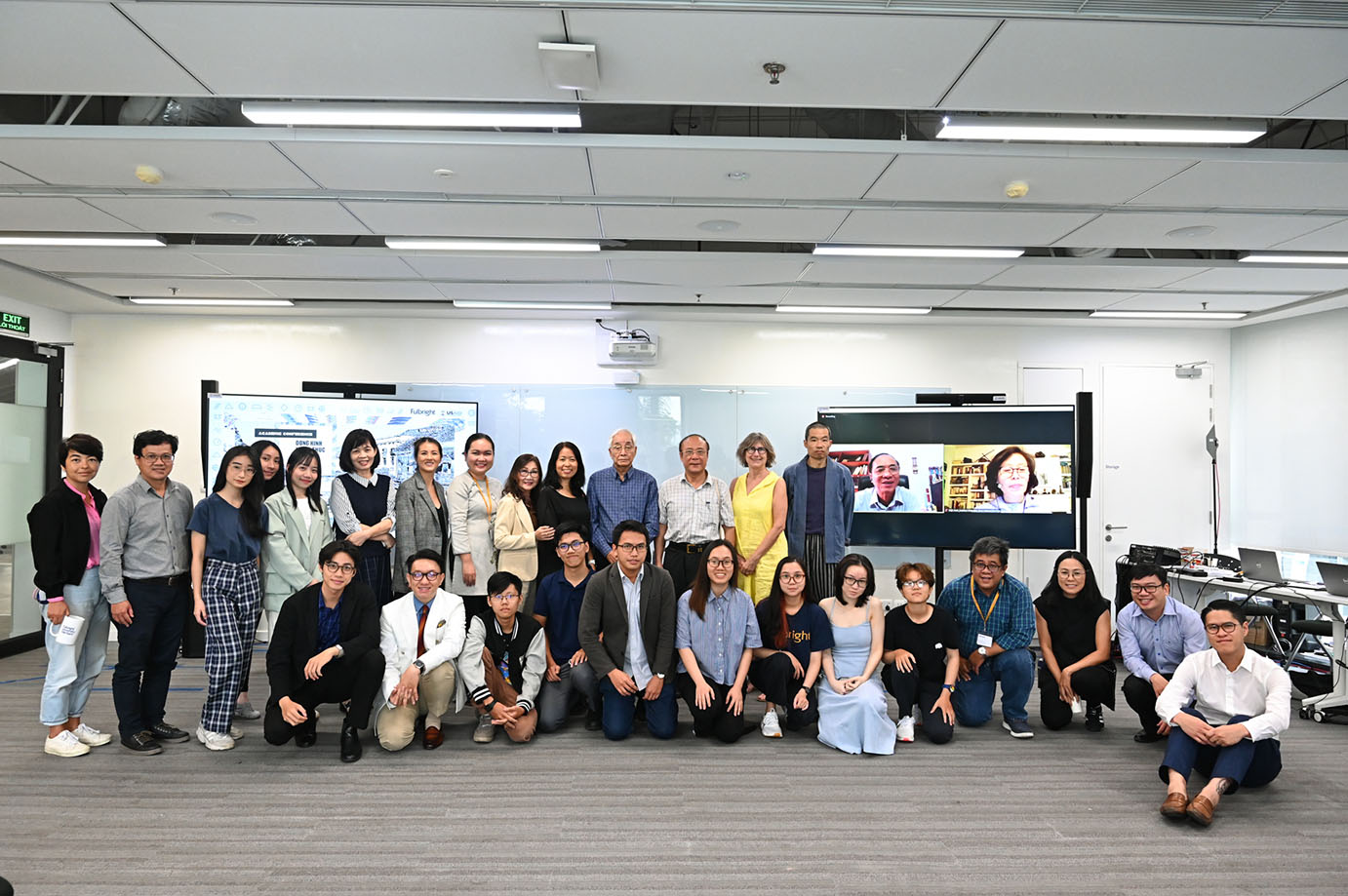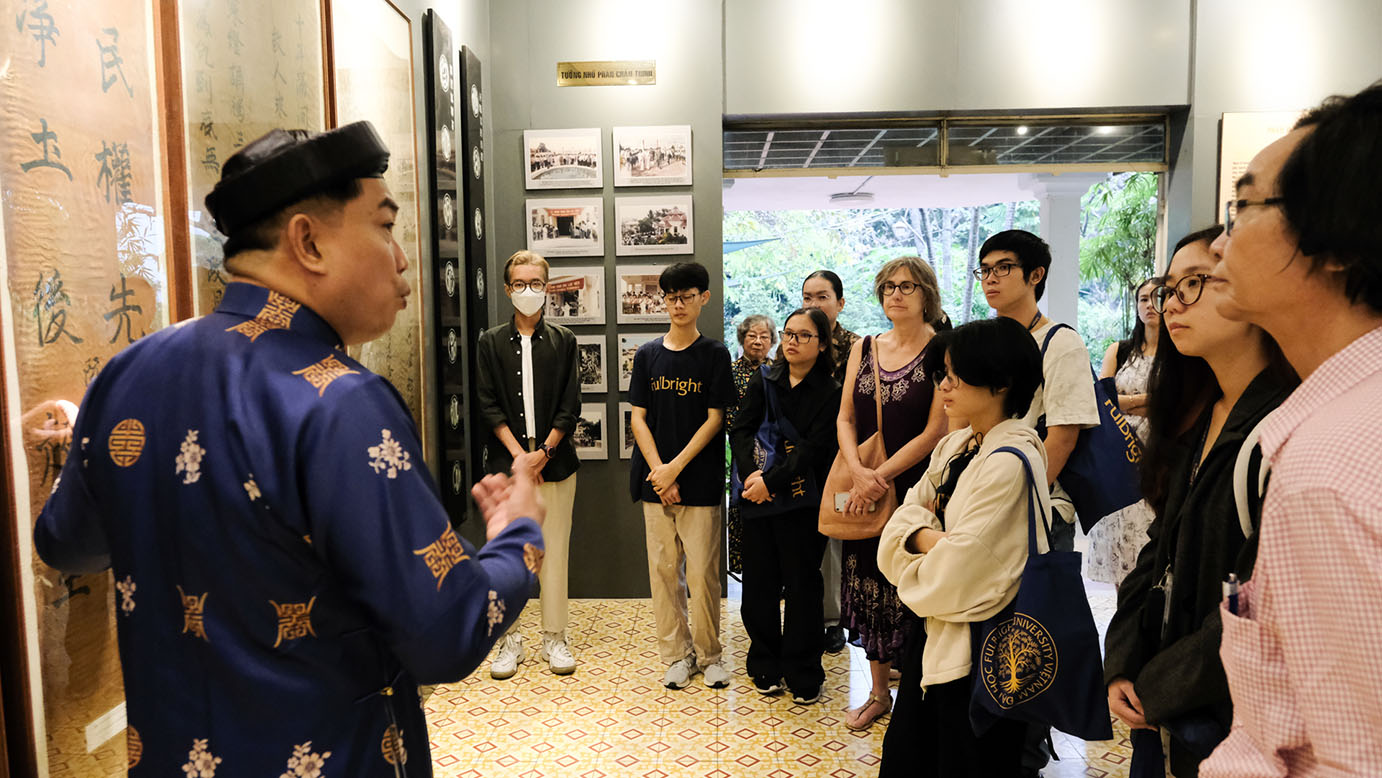
The international academic conference “Dong Kinh Nghia Thuc (Tonkin Free School) and the Vietnamese Liberal Education Model” was organized by Vietnam Studies Center, Fulbright University Vietnam, and took place on November 19 and 20, 2022. With five sessions filled with engaging discussions brought by 21 Vietnamese and international scholars, the conference presented valuable findings drawn from in-depth historical, philosophical, and cultural research. This has greatly contributed to the general knowledge of Dong Kinh Nghia Thuc, and identified key implications for the development of Vietnamese education in today’s world .
The conference was honored to welcome Prof. Trần Đức Cường, President of the Vietnam Historical Association, as its distinguished keynote speaker. “Dong Kinh Nghia Thuc has left behind a pioneering model of liberal education in Vietnam, which still serves as a valuable reference that invites everyone of us to draw our own lessons and build a modern liberal educational system whose foundation is based on the willingness to learn from other countries, while preserving our national identity and the humanistic values highly regarded by the people of our nation as sacred and worth protecting,” said Professor Trần Đức Cường, stating the unrivaled position of Dong Kinh Nghia Thuc in the history of Vietnamese cultural and educational fields.

Prof. Trần Đức Cường delivering his opening remarks
Furthermore, he also underlined the highly treasured values of literary works which were voiced and composed by the patriotic intelligentsia at the time as an effort to agitate the spirit of patriotic enthusiasm aimed towards an independent, prosperous, and modern Vietnam. As many of these great texts and documents had fallen into obscurity due to the tumults of time, the conference also provided a unique opportunity for the general public to discover for the first time these rare treasures, or get reacquainted with them.
The academic event was held when the world has witnessed and is undergoing major economic, social, political, military and cultural upheavals that have direct impacts on every single individual, no matter who they are, what they do, or where they live. Amid such complex and pressing global contexts, Fulbright’s conference on the Tonkin Free School, a patriotic movement which happened in Vietnam more than a hundred years ago, had proven to be timely, and pertinent to the country’s contemporary issues. As Dr. Nguyễn Nam, Director of Fulbright’s Vietnam Studies Center, asserted: “Lessons learned from Dong Kinh Nghia Thuc from the beginning of the last century always remind us that any efforts to pursue progress, equality, collaboration, and national independence will never be considered outdated, but on the contrary, they have been proven to be even more urgent and necessary in our global age”.

Dr. Nguyễn Nam asserts the importance of lessons learned from Dong Kinh Nghia Thuc in the current context
Liberal spirit is the foundation of a progressive educational philosophy
More than one hundred years ago, the Văn minh tân học sách (“New Learning Strategies for the Advancement of Civilization”), often considered the manifesto of Dong Kinh Nghia Thuc, had advocated for the popularization of common scientific knowledge to the general public of Vietnam, so that they could better understand the world and the conditions of their motherland at the time, and consequently, develop themselves into well-rounded citizens through the means of “unfettered discussion and open dialogue with one another”, following the spirit of self-reflection, critical thinking, and open mindedness as set forth by liberal education.

Panel discussion on “The liberal spirit of Dong Kinh Nghia Thuc”
Despite its modest scale, this international conference had proven to be scholarly enriching by nature. The Fulbright campus was honored to welcome scholars from various cities and provinces of Vietnam, including Hanoi, Nghe An, Hue, Nha Trang, Ho Chi Minh City, An Giang, as well as scholars from countries near and far such as Japan, Australia, the United States, and Canada. Many important issues presented by the scholars from their research papers became topics of fervent and in-depth discussion with Fulbright students and the attending public, such as if Dong Kinh Nghia Thuc was actually related to the Keio Gijuku of Japan; what “practical learning” meant in the early 20th century as well as in the global market economy of the 21st century; how the promotion of nationalism was associated with that of commerce and business management and the role of Vietnamese businessmen; how the concept of “hygiene” was introduced to Vietnam and employed by Confucian literati to promote the sense of citizenship in building a “clean and healthy” society; or how Vietnamese educational traditions were and have been linked to the development of regional and world educations.

Panel discussion on “Lessons from Dong Kinh Nghia Thuc for Contemporary Vietnamese (higher) education”

Panel discussion on “Cultural exchanges between Vietnam and East Asian countries from the late 19th to the early 20th centuries”
Although there remain debatable and contentious points left open for further discussion, the five panels of the conference all reached a general consensus on the importance of liberal education, in which critical thinking, an open-minded attitude, and empathy were emphasized as fundamental factors that made up the spirit of independent thinkers and learners of a nation who wished to pursue a progressive educational approach. As such, when certain aspects of liberal arts were to be understood within and adapted to Vietnam’s society and its particular historical contexts, they were incubated on the basis of the people’s wishes for national sovereignty, their patriotism and humanistic values, of which the Tonkin Free School was a prime example.

The final discussion on “Dong Kinh Nghia Thuc in national, regional, and global contexts”
Organized by and at Fulbright University Vietnam, a Vietnamese university that actively integrates Vietnamese educational traditions with the liberal arts traditions well-developed in the Western world, the conference was an opportunity for students, scholars, and the general public to look back and delve into historical remnants oftentimes overlooked regarding what can be considered the seeds of liberal arts traditions in Vietnam’s education history through the Tonkin Free School, and to re-contextualize them in today’s world and its evolving demands for education.
Reconstructing Dong Kinh Nghia Thuc through the lens of students as scholars and researchers to be
In 1907, Dong Kinh Nghia Thuc left a strong impression on the country’s compatriots when it hung high on its walls a large map of Vietnam, so that everyone could see a complete and unified image of their country. The act was to arouse in their fellow countrymen the spirit for national independence and patriotism. As an homage to that gripping image, at the conference, participants were treated to interactive digital artworks created by Fulbright students that hopefully reconstructed the scenic ambience, the historical stories, documents, photos and spirit of the time surrounding the Tonkin Free School and its founders.

Student display featuring images and historical contexts related to Dong Kinh Nghia Thuc.
Participants got to see an animated footage of Hang Dao Street, wherein the founders of Tonkin Free School held their first classes; two digital maps with interactive features; and a QR-coded display in which photos of the school’s luminaries were linked to audio recordings of their seminal writings. Humble as they were, these artworks reflected Fulbright students’ passion and total dedication to the pursuit of knowledge, and their creative self-expressions.

Dr. Nguyễn Nam is demonstrating the interactive features of the digital map to a participant

“Walk the Walks of Founders” audio display
This conference was not an event exclusively reserved for scholars. Instead, it was an event truly conducted in the spirit of Dong Kinh Nghia Thuc, in which Fulbright students were encouraged to assume the role of scholars and researchers themselves – in their efforts to excavate historical archives, reconstruct a time gone by through creative means, and debate with the conference’s panels the many issues revolving the Tonkin Free School. As we believe, our young people should nurture and develop, especially at Fulbright, their faculties for open-mindedness, critical thinking and research from the very first years of college.

“There would be no liberal education without a reciprocal relationship between the instructor and the learner. The digital humanities projects related to Dong Kinh Nghia Thuc implemented by students have shown their creativity and studious spirit in inheriting and continuing the tradition according to the trends of social development and contemporary education,” Dr. Nguyễn Nam proudly shared. He also asserted his determination towards the interdisciplinary development of digital humanities in Vietnam Studies at Fulbright, which fosters the application of digital tools and methods in the study of the humanities as the alternative media for knowledge production and distribution.
As such, the international academic conference “Dong Kinh Nghia Thuc and the Vietnamese Liberal Education Model” has demonstrated the very best of the values of interdisciplinary studies and international academic collaborations, which we believe as quintessential to Fulbright in our continued pursuit of liberal arts education in Vietnam. With lively dialogues between scholars from both Eastern and Western hemispheres; the presentation, revelation, and examination of rare historical documents; together with students’ artworks which blended the past and present, the traditional and contemporary – the conference was truly an an enriching and enlightening academic experience to all participants.
An Bình










__
About Vietnam Studies Center, Fulbright University Vietnam
The Vietnam Studies Center at Fulbright University Vietnam was established under the management and leadership of Dr. Nguyễn Nam, Director of the Center and Faculty of Vietnam Studies. It was officially launched in April 2022 with the initial support from C+P Consulting Foundation to sustain and promote Vietnamese cultural values.
The Vietnam Studies Center collaborates with the State Records and Archives Department of Vietnam in major projects in 2022 – 2023 such as the “Dong Kinh Nghia Thuc and the Vietnamese Liberal Education Model” conference , building a prototype in preparation for the development of Saigon’s Geographic Information System (GIS) through historical periods as documented in the archives, and structuralizing the French Cochinchina’s Sino-Vietnamese characters system (sổ bộ Hán – Nôm Nam kỳ) (1819-1918).







